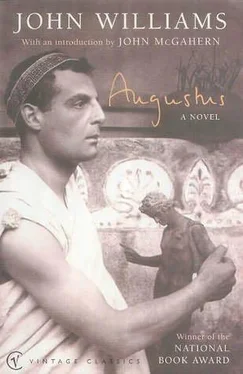John Williams - Augustus
Здесь есть возможность читать онлайн «John Williams - Augustus» весь текст электронной книги совершенно бесплатно (целиком полную версию без сокращений). В некоторых случаях можно слушать аудио, скачать через торрент в формате fb2 и присутствует краткое содержание. Жанр: Историческая проза, на английском языке. Описание произведения, (предисловие) а так же отзывы посетителей доступны на портале библиотеки ЛибКат.
- Название:Augustus
- Автор:
- Жанр:
- Год:неизвестен
- ISBN:нет данных
- Рейтинг книги:3 / 5. Голосов: 1
-
Избранное:Добавить в избранное
- Отзывы:
-
Ваша оценка:
- 60
- 1
- 2
- 3
- 4
- 5
Augustus: краткое содержание, описание и аннотация
Предлагаем к чтению аннотацию, описание, краткое содержание или предисловие (зависит от того, что написал сам автор книги «Augustus»). Если вы не нашли необходимую информацию о книге — напишите в комментариях, мы постараемся отыскать её.
Augustus — читать онлайн бесплатно полную книгу (весь текст) целиком
Ниже представлен текст книги, разбитый по страницам. Система сохранения места последней прочитанной страницы, позволяет с удобством читать онлайн бесплатно книгу «Augustus», без необходимости каждый раз заново искать на чём Вы остановились. Поставьте закладку, и сможете в любой момент перейти на страницу, на которой закончили чтение.
Интервал:
Закладка:
I tire, my dear Nicolaus. It is my age. The vision in my left eye is nearly gone; yet if I close it, I can see, to the east, the soft rise of the Italian coast that I have loved so well; and I can discern, even in the distance, the shapes of particular cottages and even make out the movement of figures upon the land. In my leisure I wonder at the mysterious lives that these simple folk must lead. All lives are mysterious, I suppose, even my own.
Philippus is stirring and looking at me apprehensively; it is clear that he wants me to cease what he takes to be work rather than pleasure. I shall forestall his ministrations, desist for a while, and pretend to rest.
At the age of nineteen, on my own initiative and at my own expense, I raised an army by means of which I restored liberty to the Republic, which had been oppressed by the tyranny of faction. For this service the Senate, with complimentary resolutions, enrolled me in its order, in the consulship of Gaius Pansa and Aulus Hirtius, and gave me at the same time consular precedence in voting and the authority to command soldiers. As propraetor it ordered me, along with the consuls, ^ cc to see that the Republic suffered no harm. " In the same year, moreover, as both consuls had fallen in war, the people elected me consul and a triumvir for settling the constitution.
Those who slew my father I drove into exile, punishing their deed by due process of law; and afterward when they waged war upon the Republic I twice defeated them in battle…
Thus begins that account of my acts and services to Rome of which I wrote you earlier this morning. During the hour or so that I lay on my couch and pretended to doze, thus affording Philippus some respite from his concern, I thought again of this account, and of the circumstances under which it was composed. It shall be engraved upon bronze tablets and attached to those columns that mark the entrance to my mausoleum. Upon those columns there will be sufficient space for six of these tablets, and each of the tablets may contain fifty lines of about sixty characters each. Thus the statement of my acts must be limited to about eighteen thousand characters.
It seems to me wholly appropriate that I should have been forced to write of myself under these conditions, arbitrary as they might be; for just as my words must be accommodated to such a public necessity, so has my life been. And just as the acts of my life have done, so these words must conceal at least as much truth as they display; the truth will lie somewhere beneath these graven words, in the dense stone which they will encircle. And this too is appropriate; for much of my life has been lived in such secrecy. It has never been politic for me to let another know my heart.
It is fortunate that youth never recognizes its ignorance, for if it did it would not find the courage to get the habit of endurance. It is perhaps an instinct of the blood and flesh which prevents this knowledge and allows the boy to become the man who will live to see the folly of his existence.
Certainly I was ignorant that spring when I was eighteen years of age, a student at ApoUonia, and got the news of Julius Caesar's death… Much has been made of my loyalty to Julius Caesar; but Nicolaus, I swear to you, I do not know whether I loved the man or not. The year before he was killed, I had been with him on his Spanish campaign; he was my uncle, and the most important man I had ever known; I was flattered at his trust in me; and I knew that he planned to adopt me and make me his heir.
Though it was nearly sixty years ago, I remember that afternoon on the training field when I got the news of my Uncle Julius's death. Maecenas was there, and Agrippa, and Salvidienus. One of my mother's servants brought me the message, and I remember that I cried out as if in pain after I read it.
But at that first moment, Nicolaus, I felt nothing; it was as if the cry of pain issued from another throat. Then a coldness came over me, and I walked away from my friends so that they could not see what I felt, and what I did not feel. And as I walked on that field alone, trying to rouse in myself the appropriate sense of grief and loss, I was suddenly elated, as one might be when riding a horse he feels the horse tense and bolt beneath him, knowing that he has the skill to control the poor spirited beast who in an excess of energy wishes to test his master. When I returned to my friends, I knew that I had changed, that I was someone other than I had been; I knew my destiny, and I could not speak to them of it. And yet they were my friends.
Though I probably could not have articulated it then, I knew that my destiny was simply this: to change the world. Julius Caesar had come to power in a world that was corrupt beyond your understanding. No more than six families ruled the world; towns, regions, and provinces under Roman authority were the currencies of bribery and reward; in the name of the Republic and in the guise of tradition, murder and civil war and merciless repression were the means toward the accepted ends of power, wealth, and glory. Any man who had sufficient money could raise an army, and thus augment that wealth, thereby gaining more power, and hence glory So Roman killed Roman, and authority became simply the force of arms and riches. And in this strife and faction the ordinary citizen writhed as helplessly as the hare in the trap of the hunter.
Do not mistake me. I have never had that sentimental and rhetorical love for the common people that was in my youth (and is even now) so fashionable. Mankind in the aggregate I have found to be brutish, ignorant, and unkind, whether those qualities were covered by the coarse tunic of the peasant or the white and purple toga of a senator. And yet in the weakest of men, in moments when they are alone and themselves, I have found veins of strength like gold in decaying rock; in the crudest of men flashes of tenderness and compassion; and in the vainest of men moments of simplicity and grace. I remember Marcus Aemilius Lepidus at Messina, an old man stripped of his titles, whom I made publicly to ask forgiveness for his crimes and beg for his life; after he had done so in front of the troops that he had once commanded, he looked at me for a long moment without shame or regret or fear, and smiled, and turned from me and strode erectly toward his obscurity. And at Actium, I remember Marcus Antonius at the prow of his ship looking at Cleopatra as her own fleet departed leaving him to certain defeat, knowing at that moment that she had never loved him; and yet upon his face was an expression almost womanly in its wise affection and forgiveness. And I remember Cicero, when at last he knew that his foolish intrigues had failed, and when in secret I informed him that his life was in danger. He smiled as if there had been no strife between us and said, "Do not trouble yourself. I am an old man. Whatever mistakes I have made, I have loved my country." I am told that he offered his neck to his executioner with that same grace.
Thus I did not determine to change the world out of an easy idealism and selfish righteousness that are invariably the harbingers of failure, nor did I determine to change the world so that my wealth and power might be enhanced; wealth beyond one's comfort has always seemed to me the most boring of possessions, and power beyond its usefulness has seemed the most contemptible. It was destiny that seized me that afternoon at Apollonia nearly sixty years ago, and I chose not to avoid its embrace.
It was more nearly an instinct than knowledge, however, that made me understand that if it is one's destiny to change the world, it is his necessity first to change himself. If he is to obey his destiny, he must find or invent within himself some hard and secret part that is indifferent to himself, to others, and even to the world that he is destined to remake, not to his own desire, but to a nature that he will discover in the process of remaking.
Читать дальшеИнтервал:
Закладка:
Похожие книги на «Augustus»
Представляем Вашему вниманию похожие книги на «Augustus» списком для выбора. Мы отобрали схожую по названию и смыслу литературу в надежде предоставить читателям больше вариантов отыскать новые, интересные, ещё непрочитанные произведения.
Обсуждение, отзывы о книге «Augustus» и просто собственные мнения читателей. Оставьте ваши комментарии, напишите, что Вы думаете о произведении, его смысле или главных героях. Укажите что конкретно понравилось, а что нет, и почему Вы так считаете.











